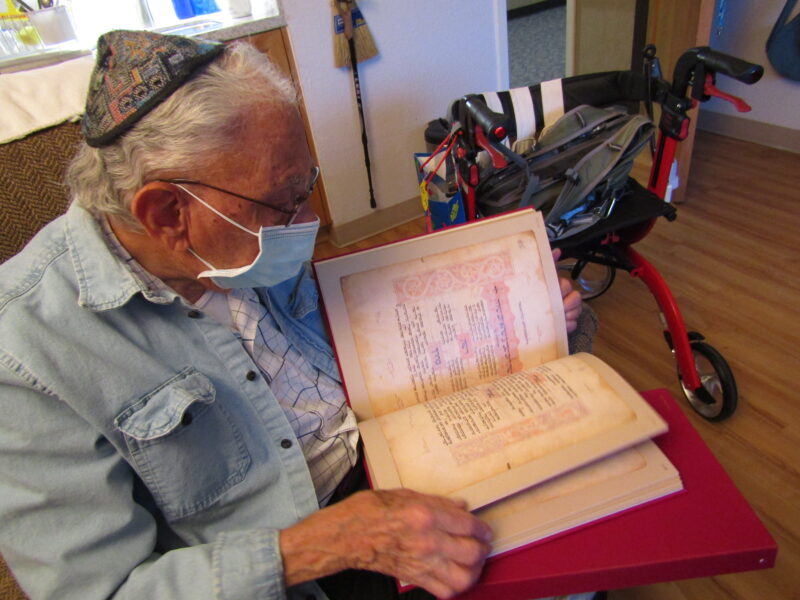When Leon Gildin closed his law firm in 1996 after practicing for more than 40 years, he gave his secretary the office computer and took the IBM Selectric typewriter home for his own use. That typewriter has seen a lot of use.
A lifelong New Yorker, he and his second wife, Gloria, moved to Sedona, where he wrote his first book. In 2000 Hippocrene Books published You Can’t Do Business (or most anything else) Without Yiddish. After the couple moved to Scottsdale in 2002, he wrote two novels. In 2009 he published his first novel, The Polski Affair, which won the International Book Award for Historic Fiction in 2010. Its sequel, The Family Affair, was published in 2011.
Though he has lately learned to use a computer to submit letters and opinion pieces to various publications, he continues to use his dependable typewriter for any major projects, including a translation of Yiddish poetry for which he is seeking a publisher. “Generally for articles and letters to the editor, I am becoming more 21st century and doing them on the computer,” says Leon. “But lengthy writing, I do on the typewriter and then I edit and cut and paste. I’m always afraid if I push the wrong button, I’ll lose what I wrote, and I know I won’t lose it if I’ve done it on the typewriter.”
His two novels deal with the real-life Polski Hotel and its bizarre place in Holocaust history. Leon learned of the little known story of the Warsaw hotel, which was either an escape route or a trap for Warsaw’s wealthy Jews, from a client. More than 30 years ago Abraham Shulman gave him an autographed copy of The Case of the Polski Hotel, which detailed the confusing facts of the Nazi operation that lured many Jews out of hiding with the promise of escape to other countries. While many were instead transported to death camps, others did receive visas and new lives elsewhere. “I saw in his research the elements of a good story,” says Leon. He did a lot of research and it was quite interesting.” Initially Leon intended to write a play. As a lawyer he had been deeply involved in show business representing many actors, writers and composers. He’d used that experience to write a short story that became the play “Appear and Show Cause,” which he co-produced off Broadway in New York winning the Audelco Award. He went on to produce other plays both on and off Broadway during his legal career. But when he began writing The Polski Affair, he soon realized it was more suited to novel form. His son, Ken, a former actor and model, has since adapted both books into scripts for possible production as a miniseries. Leon also has a daughter, Joan, who is a pediatric psychiatrist in California.
The first novel alternates between present-day Israel and flashbacks to World War II-era Warsaw. Holocaust survivor Anna Adler and her husband Chaim are raising a family in Israel when the announcement of a reunion at the Hotel Polski sends Anna back to Poland, in both flashbacks and reality, seeking closure on the loss of her first husband and sons. Having to testify at the war crimes’ trial of the hotel’s commandant, who chose her as his personal servant, causes Anna to confront her past. In the sequel two years later after the reunion, Anna faces both joyous and devastating revelations from her past. As silence gives way to truth, families struggle to come to grips with what they thought they knew. The horrors of the Holocaust continue to inflict pain long after the Nazis lost the war.
For Leon, now 85, the two books have generated numerous speaking invitations. “I have lectured and have had book signings on numerous occasions here in the Valley before Temple groups, organizations, Barnes & Noble, etc., as well as New York and the Skirball in LA. says Leon. Two years ago he was the opening speaker at the Jewish Book Month celebration at the Valley of the Sun Jewish Community Center. He continues to receive requests to speak at other Jewish Book Month and Yom HaShoah (Holocaust remembrance) programs.
Yet he finds that his thoughts have turned more and more to another kind of remembrance – the role of the Yiddish secular movement in the first half of 20th century America. He says the roles of those Jewish immigrants from Eastern Europe as founders of the labor movement in America and as founders of the concept of cooperative housing have been largely forgotten. He sees the impact of Yiddish culture on newspapers and theater as important elements in our culture. He grew up in that world of Yiddish-speaking immigrants in New York; his mother emigrated from the Ukraine in 1905, and his father arrived from the same region in 1912. He grew up speaking English and Yiddish at home and attending Yiddish schools and camps.
“Unfortunately, in my opinion, it is a movement that has been completely overlooked except by certain scholarly people as to ts effects on American culture and American sociology,” says Leon. Recently, he has turned his writing skills to try and remedy that oversight. He also has devoted his time to submitting to various publications opinion pieces about the importance of Yiddish culture.
This current work is perhaps a more serious exploration than his first book, You Can’t Do Business Without Yiddish. That book provides a humorous look at the Yiddish phrases that have become an integral part of American culture, as well as a glimpse of the Jewish experience in contemporary America.
“I’m a strong believer of the effect the Yiddish secular movement had on America from the early 1900s to the 1960s. I’ve written a number of articles about that and about Jewish education,” he says. “Without an education that includes the profane as well as the religious, you are not giving your kid a Jewish education. Those things that had an impact on Jewish life in America and Jewish continuity are not spoken about…Famous Yiddish writers and the great accomplishments of those people over 50 to 60 years – without that, to my way of thinking, a kid isn’t getting a Jewish education.” The lack of interest in Yiddish writers is also reflected in the small market he has found for his most recent manuscript – a translation of Yiddish poetry.
“It’s a small market, practically nonexistent,” he laments. “I feel my only choice is an academic press.” But market or no, he intends to keep busy writing and speaking on his passion for Yiddish.





